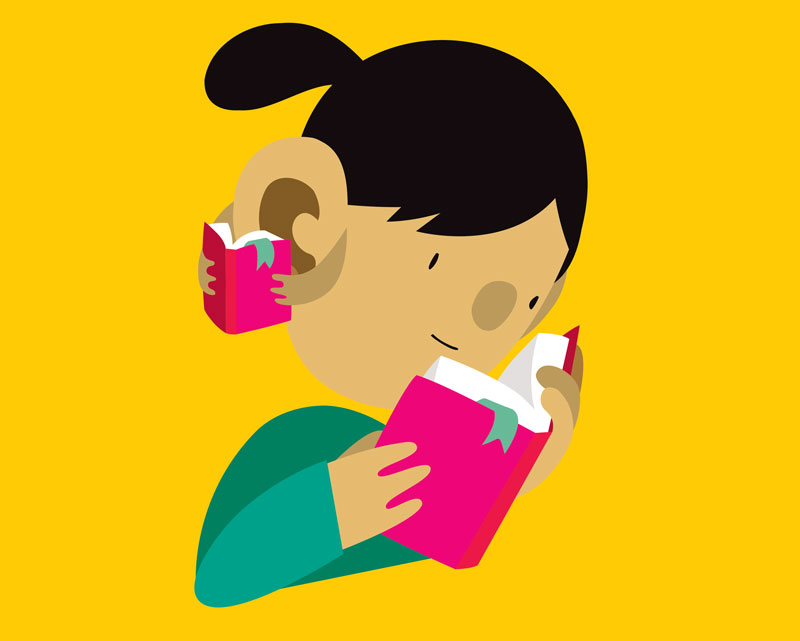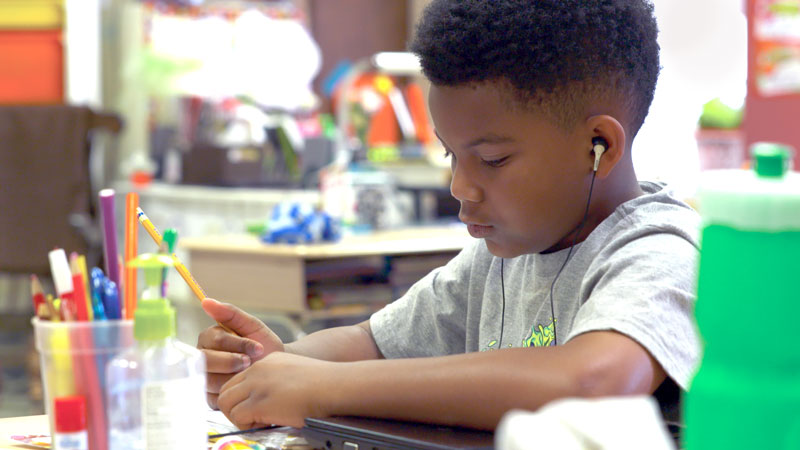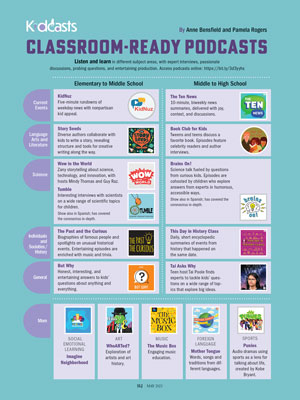An Ear for Reading: Audiobooks Take Center Stage in the Classroom
Educators are using audiobooks in new ways to teach material and help students build literacy skills. Plus: 15 classroom-ready podcasts.
 |
Illustration by Alex Eben Meyer |
As educators adjusted to a radically altered learning environment last fall, high school librarian Erin Cassaro realized she needed to do something different to support the literacy needs of her students.
“We knew it would be difficult for kids to have access to physical books, so we invested a lot in ebooks and audiobooks,” says Cassaro, who works in Dublin (OH) City Schools. “What we have seen this year is that when kids are exposed to audiobooks and get a chance to experience them, they are hooked.”
 Cassaro is one of many librarians and classroom teachers around the country who are increasing their use of audiobooks as a teaching tool. With many students learning from home this year, there has been a surge in the use of all digtal resources in schools, including ebooks and audiobooks. According to SLJ’s 2020 School Library Budget & Spending Survey, about 30 percent of respondents reported that they planned to spend more on audiobooks this school year.
Cassaro is one of many librarians and classroom teachers around the country who are increasing their use of audiobooks as a teaching tool. With many students learning from home this year, there has been a surge in the use of all digtal resources in schools, including ebooks and audiobooks. According to SLJ’s 2020 School Library Budget & Spending Survey, about 30 percent of respondents reported that they planned to spend more on audiobooks this school year.
Educators are using audiobooks in new ways to teach material and help students build literacy skills. Instead of using audiobooks as a learning station, where one student at a time or a few students listen to them during reading time, many educators are using them for entire class reading assignments and class discussions. Teachers in some schools are using audiobooks as a social-emotional tool by playing guided mindfulness recordings to help students relax and focus in class. New tech resources have made it easier for students to access audiobooks both at school and at home, enabling families to listen to books together and practice and reinforce skills that students are learning in class.
“There are so many advantages to using audiobooks,” says Kate Loker, a middle school librarian at Dempsey Middle School in Delaware, OH. “We have witnessed students who are reluctant to pick up a book but then they will listen to the audiobook and they love the story. We want students to love books and reading. Audiobooks increase their love of literacy.”
ResourcesAudible Bookshare Follett Learning Ally LibriVox Libro.fm Mackin Sora Storynory SYNC Tales2go |
Audiobooks have been around for decades, but the format took off in the 1990s when companies could compress files and release books digitally. With the rise of smartphones and audiobook apps, audiobook sales have grown rapidly in recent years, fueled by companies such as Audible and Apple. In 2020, audiobook unit sales soared 17 percent over the previous year, according to a recent report by NPD Group. One in six books sold last year was in the digital audio format, the data shows. Some authors are now skipping print altogether and writing content that goes straight to Audible, which is owned by Amazon.
The production level has also improved; now audiobooks have high sound quality and many are read by well-known voice actors.
Companies that offer audiobooks for students and young people include suppliers such as Mackin, which has long sold print resources for schools and libraries and has moved into digital offerings; and tech companies like Tales2go, which is focused on providing audiobooks for students in schools. Audible began offering a large selection of free audiobooks in different genres for kids when schools closed last spring, and those are still available.
OverDrive’s Sora app, introduced in 2018, allows students to check out ebooks and audiobooks from their school collection and also connects students in schools with resources at public libraries. At schools using Sora, audiobook check-outs grew 61 percent in 2020 over 2019, according to OverDrive. The largest growth was seen in juvenile nonfiction and young adult nonfiction. Sora is now available in about 44,000 schools, including New York City public schools, the largest school district in the country.
“We have reached a new level of awareness about what digital books can do,” says Angela Arnold, general manager of OverDrive Education. “This year, teachers were looking for materials that kids can handle on their own. There is more recognition that kids learn differently from each other. Audiobooks are a powerful tool for personalized learning.”
“There has recently been a change in mindset among educators,” says William Weil, cofounder and CEO of Tales2go. “Librarians and educators are more open to doing literacy differently. They see that audiobooks are part of literacy.”
New uses in schools
When it comes to using audiobooks as a learning tool in schools, there has long been debate about whether audiobooks count as “real” reading, since students are not decoding and figuring out the words as they read. However, researchers and educators now recognize the many benefits of audiobooks for learners of all ages and abilities.
“Audiobooks are reading,” says Denise Johnson, a professor of reading education at William & Mary who studies literacy learning and conducts research on the uses of technology in education. “The idea that we must decode in order to read is an unfair way to think about it. The goal is comprehension.”
When kids can’t decode, it can make a book inaccessible, says Johnson. “But just because a kid can’t read at a high level, that doesn’t mean they can’t understand and comprehend at a high level. Using audiobooks opens up access and levels the playing field. Kids can all listen to the same book and then can talk and discuss it and have rich conversations.”
Audiobooks also help with fluency, since students hear the way a story should sound when it is read. This benefits students who struggle with reading as well as students who are English language learners.
The fact that audiobooks can be accessed digitally in schools has also been a huge boon this year. “The pandemic fortunately—and unfortunately—has pushed educators to be aware of digital resources that they had not been aware of,” says Johnson. “As parents took on responsibility for a great deal of teaching, the audiobook was sometimes the only thing they could get their hands on.”
Johnson adds that the use of audiobooks at home this year has also given parents more insight into what their kids are reading and enables them to engage more with their child’s schoolwork. She also notes that audiobooks allow students to have more access to books for pleasure since they have an array of choices of what they can listen to.
 |
A third grader at W.J. Gurganus Elementary School in Havelock, NC, listens and takes notes during a literacy rotation.Photo courtesy of Tales2Go |
Audiobooks have also become a helpful social-emotional tool for educators. Loker, the middle school librarian, says that some teachers in her district play audiobook stories after recess to help students transition to their next task. Another benefit is that audiobooks provide a way for students to have “off-screen” learning, since they don’t need to stare at a screen while they listen to a story, she notes.
Her district has five elementary schools. In usual school years, the district has author visits for all the students in the different buildings. Since they weren’t able to have those visits this year, the district signed up with Tales2go so that all the kids in the elementary schools could listen to audiobooks. Because kids are able to access their account at home, a lot of families are listening to stories together outside of school, Loker says.
“Since they can’t go to the public library, this has become something they can do together as a family,” Loker notes.
She adds that staff members have also been encouraged to listen to audiobooks.
“It helps create a culture of reading with the staff,” Loker says.
Sarah Ressler is the librarian at Hayes High School in the same district as Loker, and the two often work together to promote audiobooks. Ressler has been a huge fan of audiobooks for more than 20 years. In her former role as a high school English teacher, she used audiobooks so her students could hear well-known works read aloud.
“When I taught Shakespeare, I would always play the audio with trained actors,” she says. “It was so helpful for the kids to hear it. We would listen to scenes and discuss them.”
As a librarian, she has been teaching students how to use services such as Libby and Hoopla to access audiobooks at the public library. Ressler, who is also the president of NCTE’s ALAN (Assembly on Literature for Adolescents), works closely with other teachers at her school to inform them about the benefits of this format and has been working to increase the use of audiobooks across all subject areas at her school, including math and health. Ressler has even gotten posters for teachers to hang up in her school that say “Audiobooks Are Not Cheating.”
“My staff is really on board with audiobooks, and I have gotten a lot of teacher buy-in,” she says. “When I go into classrooms and talk about the books, I always tell them I will get [books] to them in audiobook and print book format. There is a culture here. Teachers are always encouraging kids who don’t want to read to find the audiobooks. It’s also a natural transition to life after high school. My goal is to create lifelong readers, and when I say readers, I don’t mean just print book readers.”
 |
| Click to see larger |
It helps that the school principal, Dr. Ric Stranges, is also a “huge” audiophile, adds Ressler. “He has presented with me at conferences on how audiobooks are meaningful to him as a leader as well as to our staff and students,” she says.
Cassaro is running a virtual book club at Dublin City Schools this year, and many of the students who participate are learning remotely. She says some of the students have been listening to the audiobooks. She has also been working to ensure that the books that are required reading in her school are available as audiobooks, and that students and staff are aware of what they can access.
“We are doing a lot in our building to highlight diversity,” Cassaro says. “I am always sending out info to my staff and students to let them know about the books and the audiobooks we have for certain months, such as National Poetry Month and Black History Month.”
Cassaro is also encouraging kids to record themselves reading parts of books and poems and to share those recordings with others, essentially creating their own audiobook stories. “It allows them to have voice in a different way.”
Looking ahead
While there is uncertainty about when schools will re-open fully and what learning will look like in the future, educators expect audiobooks to be a key part of the mix.
“I would like to continue to build my audiobook collection,” Cassaro says. “Teachers are picking them up more, and I am seeing more of a need for it. I would like to incorporate more input about what students want and categories they would like to see. I want them to have access to audiobooks that that they can see themselves in.”
In her district, Ressler plans to promote a free summer audiobook reading program called SYNC, which delivers audiobooks to kids through the Sora app. Students 13 and up get two audiobooks each week in the summer and have already been signing up.
Weil, of Tales2go, concurs that audiobooks will continue to grow in schools. He notes, “Kids always love listening to a good story well told.”
Melanie Kletter is a teacher and freelance writer in New York City.
RELATED
The job outlook in 2030: Librarians will be in demand
The job outlook in 2030: Librarians will be in demand
ALREADY A SUBSCRIBER? LOG IN
We are currently offering this content for free. Sign up now to activate your personal profile, where you can save articles for future viewing






Add Comment :-
Be the first reader to comment.
Comment Policy:
Comment should not be empty !!!